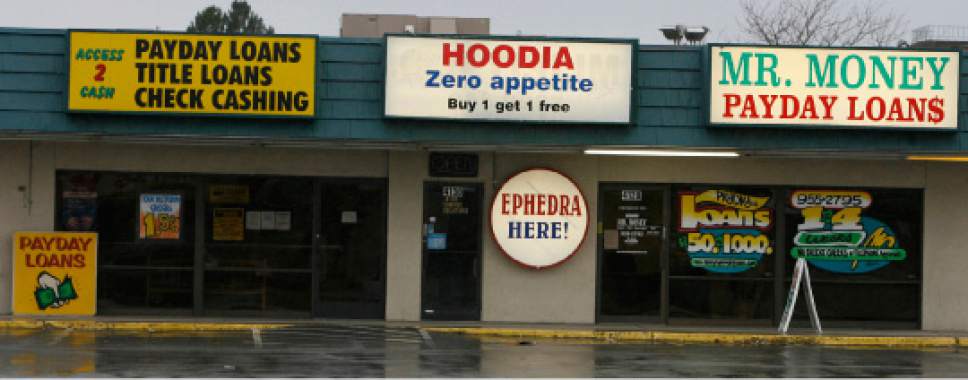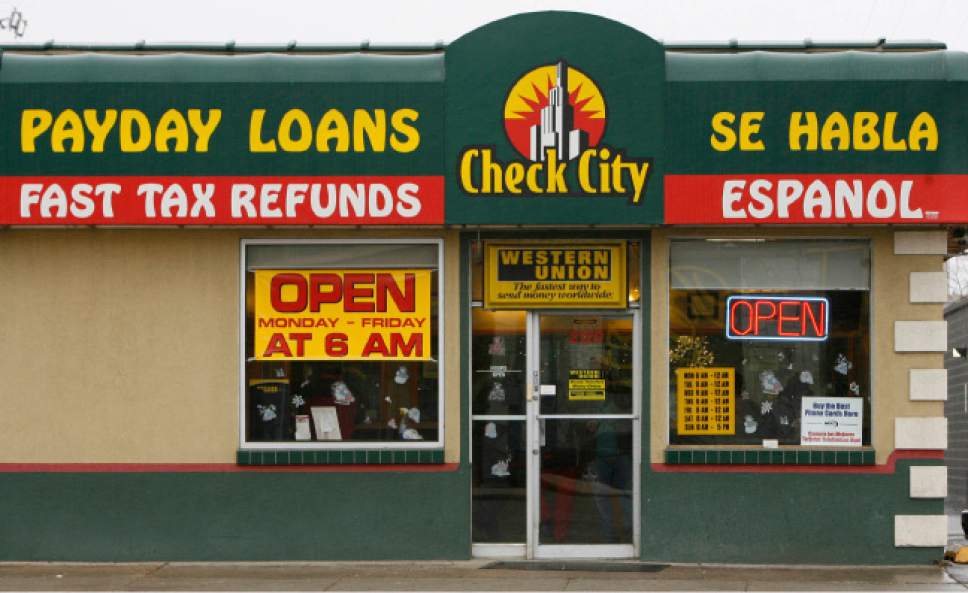This is an archived article that was published on sltrib.com in 2017, and information in the article may be outdated. It is provided only for personal research purposes and may not be reprinted.
Payday loans in Utah charge an average of 459 percent annual interest. That's down a bit from the previous year's 482 percent average, but still approaches double the interest academic studies that say the New York Mafia charged for its loans in the 1960s.
New annual data from the Utah Department of Financial Institutions also say some payday lenders in the state charged annual interest as high as 1,408 percent during 2015 — or $27 a week on a $100 loan.
And 43,564 payday loans — equivalent to one for each resident of Bountiful — were not paid off by the end of the 10 weeks that they may be legally extended.
Critics say such data show the loans are "debt traps" that easily snare the unwary and again are pushing for reform in the upcoming Legislature. But the payday loan industry says, because of changes in recent years, borrowers generally are well served, protected and satisfied.
Most payday loans are for two weeks, or until a borrower's next payday. Utah law allows renewing them for up to 10 weeks, after which no more interest may be charged. But critics say the poor are often pressured to take out new loans to avoid legal action and fees over a default on the original, leading to spiraling debt.
New state data say the average payday loan in Utah is for $324 and takes 32 days to pay.
The state says 51 payday loan companies, 69 title loan firms (offering high interest rates on loans secured by cars) and 28 internet payday loan firms are registered in the state.
They have 553 physical stores in Utah — exceeding the number of Subway, McDonald's, Burger King and Wendy's restaurants in the state combined.
—
Debt traps? • "Of course [payday loans] are debt traps. That's why so many people default," said Bill Tibbitts, president of the Coalition of Religious Communities, which has long contended the loans target the poor who cannot afford them.
"A normal loan company makes its money when people pay back loans," he said. "Payday lenders make their money when people don't pay on time" and extend payments at ultra-high interest or take out new loans to pay off old ones.
Tibbitts called 459 percent interest "ridiculous," adding, "People complain about having a credit card with 15, 20 or 25 percent interest. Multiply that by about 20, and you have what payday loans charge."
Wendy Gibson, spokeswoman for the industry's Utah Consumer Lending Association, disagrees — and says state-required posting of annual interest rates is a misleading measure for payday loans that may charge interest for only up to 10 weeks under state law.
"An annual percentage rate of 459.14 percent equates to a fee of $8.81 for a $100 loan for one week," she said. "Payday loans give borrowers far better, less expensive options than overdrafts, returned check charges and utility disconnect/reconnect fees."
People with poor credit often cannot obtain loans in emergencies from banks or credit unions, Gibson said. So using payday lenders actually saves "money over more expensive alternatives while having access to much-needed credit."
—
Varying rates • So why do some payday lenders charge up to 1,408 APR, and some charge as little as zero percent?
"Some lenders charge a flat fee regardless of loan duration, which result in an APR that varies and is sometimes higher than the average rate" if borrowers pay them off early, Gibson said. Some loans are offered at zero percent interest in promotions, so she urges borrowers to shop around for deals.
Rep. Brad Daw, R-Orem, a longtime critic of payday loans, is concerned about the 43,000-plus loans that were not paid off within 10 weeks in Utah. "If you are getting into debt for a two-week loan, and it's taking you 10 weeks or six months or a year to pay them off, it's hard not to call them a debt trap."
Last year, he passed a bill requiring that before payday lenders could sue borrowers for default, they must offer them in writing the chance to enter an extended payment plan at no interest. Such plans had been available under previous legislation, but did not have such a strict notice requirement on lenders.
Daw's bill last year came after The Salt Lake Tribune reported that the payday loan industry sued 7,927 Utahns for default in 2015, equivalent to suing every resident of Park City.
State data show that 7.6 percent of payday loan borrowers in Utah were given extended payment plans in 2015. Gibson said that indicates reforms requiring it "are working and provide adequate protection."
—
Legislation • This year, Daw is proposing another bill that would officially prohibit providing or obtaining new payday loans to cover older ones. It is supported by both the industry and critics. "Enforcement will be a challenge," Daw said. "But it is a negotiated settlement. I'd like to do more, but that is what we were able to negotiate."
For example, he said he would like to find a way to cap the high interest rates charged by the industry someday, but sees little political support for it now.
Not too many years ago, Utah House investigators who looked into scandals leading up to the resignation of former Attorney General John Swallow said the payday loan industry retaliated against Daw for his reform bills by using shady tactics and financing funneled through Swallow to defeat Daw in 2012. He won re-election two years later.
Gibson said legislation in recent years brought many improvements, including requiring that all lenders make an inquiry about a borrower's ability to repay, offer an interest-free extended payment plan, report more data to state regulators and expand the extended payment plan to more borrowers.
With that, she said, "Consumers are well protected and satisfied with payday loans, which explains why there is an extremely low number of complaints," just seven made to state regulators in 2016.
However, a legislative audit in August found state regulators are failing to enforce rules. Auditors determined that 32 percent of all payday borrowers are "chronic" users of the service. Another 14 percent were in default, meaning half of all payday borrowers were swamped with the debt. The audit called for laws to limit access to loans for those who do not use them responsibly.
Also, the federal Consumer Financial Protection Bureau has proposed rules to force lenders to determine whether borrowers can afford to pay back their loans.
It proposes to cut off repeated attempts to cash postdated checks written when the loans are made, which rack up fees and make it harder for consumers to get out of debt.
@LeeHDavidson





